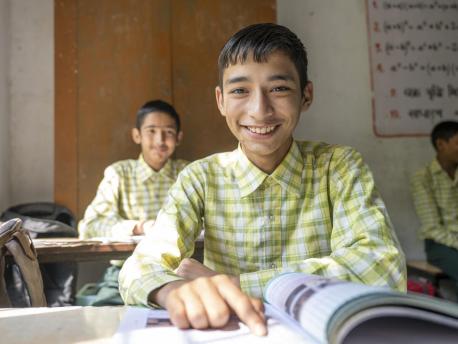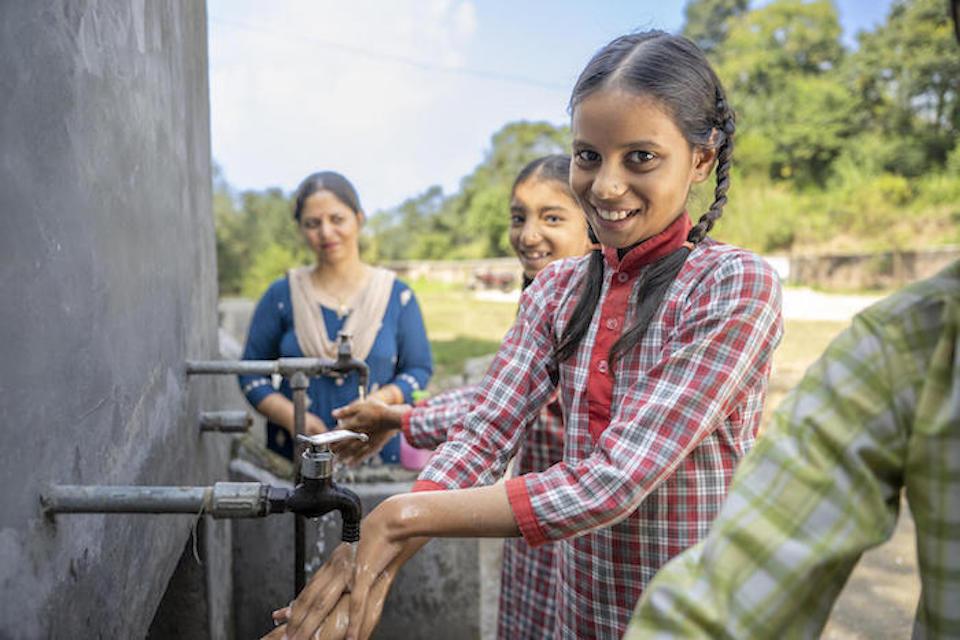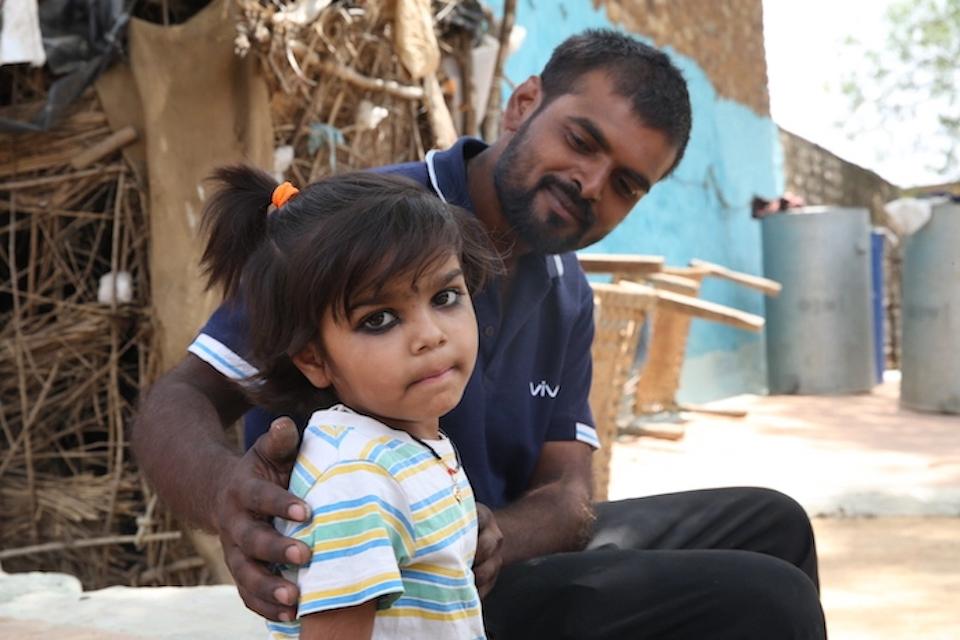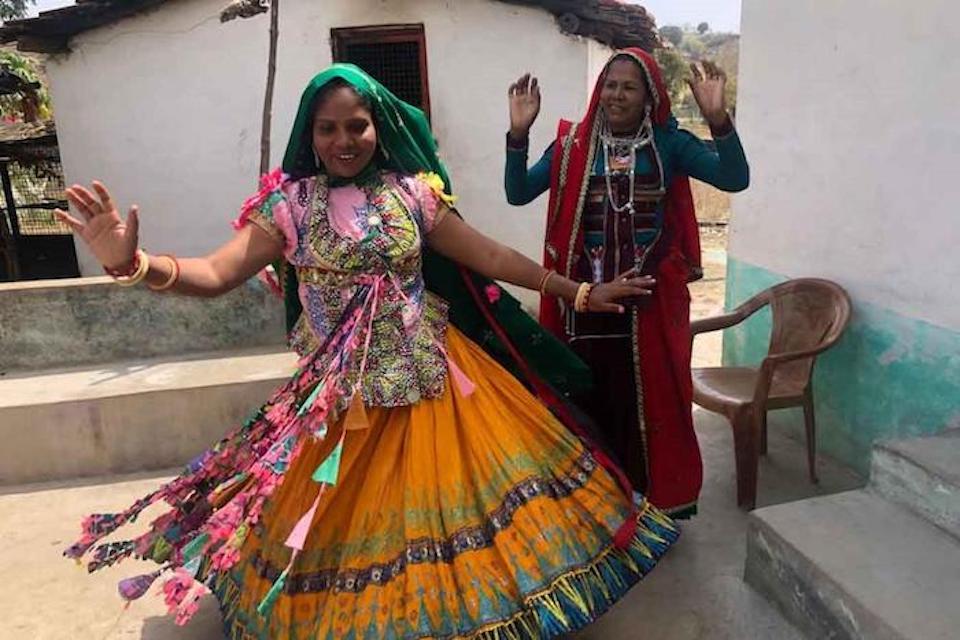
Support Kids in India
Millions of children in India need health care, education, protection, water and sanitation and other support. UNICEF is there.
UNICEF in India: making sure children are healthy, educated, protected and respected
India’s economy is among the fastest-growing in the world, and many positive developments have coincided with this growth.
Extreme poverty in the country has dropped by 20 percent. Infant mortality is down by half. And 2 million more children are now in school.
Yet many children in India continue to face many challenges. An estimated 280 million children in the country are in need of humanitarian assistance.
Challenges for children in India
Many children die from preventable diseases and many miss out on routine vaccinations. Less than half of all children in third grade can read a text meant for first graders.
Girls in India are highly vulnerable to sexual violence and early marriage. In fact, one in three of the world's child brides lives in India. India is the only country in the world where more girls die than boys, yet there are fewer girls born than boys.
Learning losses during the COVID-19 pandemic have affected over 280 million children. Violence against children, particularly gender-based violence, is highly prevalent yet invisible.
The vast majority of India's 35 states are prone to natural disasters — earthquakes, landslides, droughts and floods — that destabilize communities and put already vulnerable families at further risk.

How UNICEF supports children in India
UNICEF supports children in India in all program areas, including health, education and child protection. For example, UNICEF is:
Improving community health
- immunizing tens of millions newborns every year against vaccine-preventable disease
- reaching millions of people with safe water, sanitation and hygiene (WASH) supplies and services
- improving communal sanitation in densely populated urban areas for better protection against infectious disease
- providing iron and folic acid supplements for millions of pregnant women
- encouraging best practices like regular handwashing to change behaviors critical to public health
Supporting quality education for all
- promoting reading among elementary school students with a campaign called “Reading for Joy”
- setting up mobile learning vans and community learning camps with support from volunteers, trained teachers and community leaders
- establishing a ‘School in a Van’ program to provide out-of-school children in vulnerable communities with opportunities to learn
- providing technical support to state governments to facilitate safe school reopenings following COVID-19 closures
Protecting children's rights
- offering life skills programs to adolescents, instruction in digital and financial literacy and other interventions that help prevent early marriage
- providing children and caregivers with mental health and psychosocial support
- working with governments to strengthen social safety nets for impoverished households
- supporting children who lack parental care through Project LION
Reducing disaster risks
- building climate resilience by strengthening water systems, making schools safer and more secure. and increasing flood and drought preparedness to avoid displacement and interruptions in education
- working directly with communities and supporting youth participation in disaster risk reduction education and program implementation
Stories from India
Here are a few examples of how UNICEF is working to support children in India:
Supporting parents with an innovative messaging service
A UNICEF-supported project has established a creative method of delivering tips and advice about child rearing to new parents.
The service was launched during the pandemic when parents were not able to receive in-person help. It is relatively low-tech, which means parents can receive audio messages without an internet connection or smartphone. So far, 30,000 users have signed up, and according to a survey, parents reported the service helped them feel more confident about managing their child’s development. Learn more.

Closing India's digital access gap
UNICEF is partnering with the software company SAP to provide teenagers in India the opportunity to learn technological skills that will help them professionally excel. Nearly 25,000 secondary school students in 150 schools are enolled in the pilot program, where students learn about different career paths and receive guidance about colleges and entrance exams. Nearly half (49 percent) of student participants are girls in grades 9 through 12.
For Babita Saini, a science teacher participating in the program, the real impact has been the dialogue it has fostered, introducing girls with empowering views about careers and gender. Learn more.
Boosting vaccine acceptance
Frontline health workers are playing a crucial role in fighting vaccine myths and misinformation. Adapting the lyrics of traditional folk songs has helped increase awareness of the importance of vaccines and vaccine acceptance within tribal communities. Learn more.

How you can help
UNICEF works in more than 190 countries and territories to deliver lifesaving and life-changing assistance to children and families in need. Donations go a long way in helping these children live the lives they deserve. Donate today.
HOW TO HELP
There are many ways to make a difference
War, famine, poverty, natural disasters — threats to the world's children keep coming. But UNICEF won't stop working to keep children healthy and safe.
UNICEF works in over 190 countries and territories — more places than any other children's organization. UNICEF has the world's largest humanitarian warehouse and, when disaster strikes, can get supplies almost anywhere within 72 hours. Constantly innovating, always advocating for a better world for children, UNICEF works to ensure that every child can grow up healthy, educated, protected and respected.
Would you like to help give all children the opportunity to reach their full potential? There are many ways to get involved.





